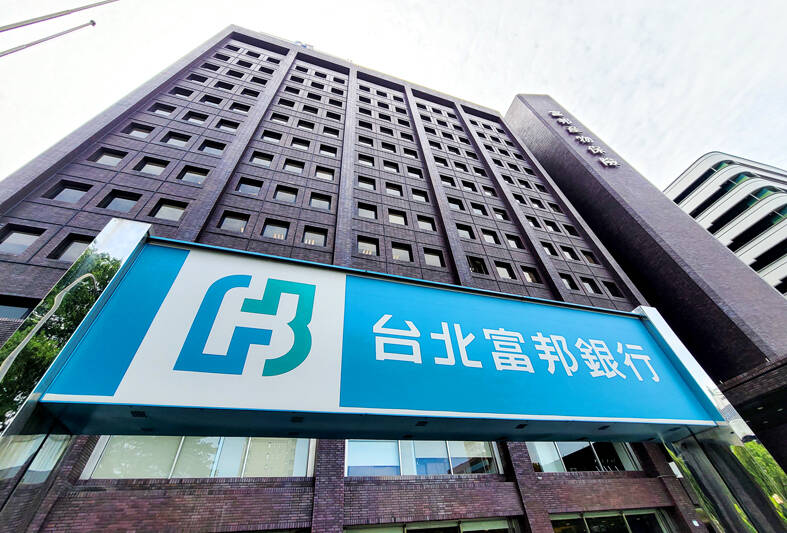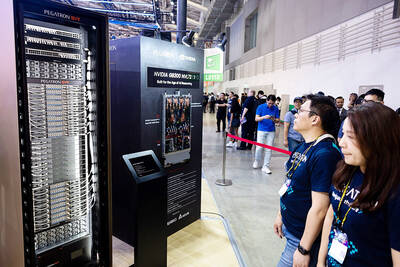Fubon Financial Holding Co (富邦金控) yesterday voiced optimism about Taiwan’s economy, saying the worst is over and that GDP growth would reach 3 percent next year, which would be favorable to its operations.
Fubon Financial chief economist Rick Lo (羅瑋) unveiled his projections during an online media briefing, citing improvement in the nation’s exports, a critical economic gauge.
Exports last month slipped back into contraction, but might stage a sustained rebound from this month onward, the Ministry of Finance has said.

Photo: CNA
Major tech firms offered similar earnings guidance.
Lo said the market is now less concerned about whether the US Federal Reserve would raise its policy rate by another 25 basis points to tame inflation and avoid asset bubble busts.
The Fed would assign more importance to how its earlier rate hikes would affect the US economy, a process that needs more time to pan out, Lo said.
The restrictive monetary cycle is likely over in light of the latest US inflation data, he added.
The market is now looking at an interest rate cut of 0.75 percentage points by the Fed in June next year to avert a recession, Lo said.
A lenient monetary stance is favorable to corporate investment and capital expenditure as borrowing costs drop.
Private investment is widely expected to regain growth momentum next year after playing a laggard this year, Lo said.
Consumer spending would stay healthy, helped by a resilient job market, although the benefits of revenge consumption would taper off, he said.
Taipei-based Fubon Financial retained its title as the most profitable financial holding company with cumulative net earnings of NT$67.8 billion (US$2.13 billion), or NT$4.94 per share, company data showed.
Fubon Financial said it intends to raise its stakes in bonds and equities if monetary tightening is over.
It trimmed its stock holdings to 7.9 percent at the end of last quarter, from 8.8 percent a year earlier, after realizing capital gains, officials said.
Main subsidiary Taipei Fubon Bank (台北富邦銀行) last quarter became the nation’s second-
largest credit card issuer, based on the number of active cards, after it replaced Cathay United Bank (國泰世華銀行) in August as Costco Taiwan’s exclusive partner.

AI TALENT: No financial details were released about the deal, in which top Groq executives, including its CEO, would join Nvidia to help advance the technology Nvidia Corp has agreed to a licensing deal with artificial intelligence (AI) start-up Groq, furthering its investments in companies connected to the AI boom and gaining the right to add a new type of technology to its products. The world’s largest publicly traded company has paid for the right to use Groq’s technology and is to integrate its chip design into future products. Some of the start-up’s executives are leaving to join Nvidia to help with that effort, the companies said. Groq would continue as an independent company with a new chief executive, it said on Wednesday in a post on its Web

RESPONSE: The Japanese Ministry of Finance might have to intervene in the currency markets should the yen keep weakening toward the 160 level against the US dollar Japan’s chief currency official yesterday sent a warning on recent foreign exchange moves, after the yen weakened against the US dollar following Friday last week’s Bank of Japan (BOJ) decision. “We’re seeing one-directional, sudden moves especially after last week’s monetary policy meeting, so I’m deeply concerned,” Japanese Vice Finance Minister for International Affairs Atsushi Mimura told reporters. “We’d like to take appropriate responses against excessive moves.” The central bank on Friday raised its benchmark interest rate to the highest in 30 years, but Bank of Japan Governor Kazuo Ueda chose to keep his options open rather than bolster the yen,

Even as the US is embarked on a bitter rivalry with China over the deployment of artificial intelligence (AI), Chinese technology is quietly making inroads into the US market. Despite considerable geopolitical tensions, Chinese open-source AI models are winning over a growing number of programmers and companies in the US. These are different from the closed generative AI models that have become household names — ChatGPT-maker OpenAI or Google’s Gemini — whose inner workings are fiercely protected. In contrast, “open” models offered by many Chinese rivals, from Alibaba (阿里巴巴) to DeepSeek (深度求索), allow programmers to customize parts of the software to suit their

Global server shipments are expected to surge to 15 million units next year, from 4 million units this year, with artificial intelligence (AI) servers accounting for about 30 percent, driven by massive capital spending by major cloud service providers, the Market Intelligence and Consulting Institute (MIC) said on Thursday last week. Major cloud service providers — including Google’s parent company Alphabet Inc, Microsoft Corp, Amazon.com Inc and Meta Platforms Inc — are projected to budget US$450 million for capital expenditure next year, up from US$400 million this year, MIC ICT [information and communications technology] Industry Research Center director Edward Lin